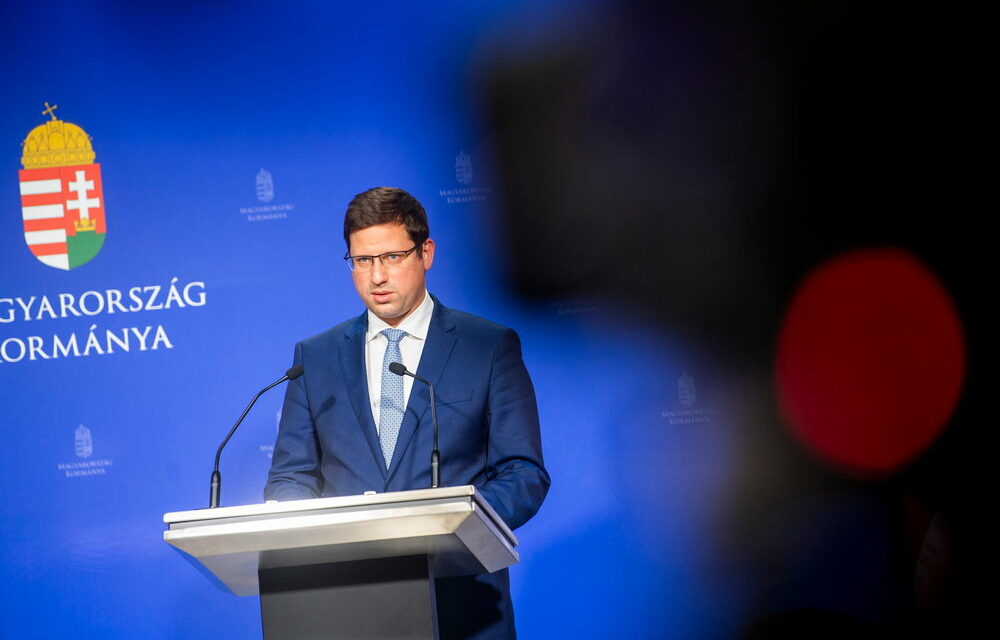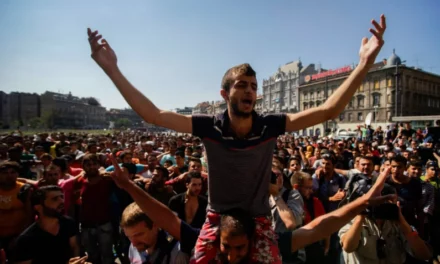The government has adopted an economic action plan: there will be a price ceiling for electricity in some sectors, the SZÉP card can also be used for cold food, and drug distribution companies can write off half of their extra profit tax, the minister in charge of the Prime Minister's Office announced on Monday in Budapest, on the Government Information. Gergely Gulyás also said that Hungary continues to advocate for a ceasefire and peace negotiations in the war in Ukraine.
The minister stated that the price ceiling will be set at a net 200 euros/megawatt hour from July 1, and it applies to the manufacturing industry, accommodation services, as well as storage and transportation.
According to his rationale, these are sectors that have the greatest impact on the economy's performance and inflation, as these are productive or production-related activities.
He added:
in return, the government expects these companies to increase their production capacity and not raise prices for the rest of the year; this will be checked by the Hungarian Chamber of Commerce and Industry.
He indicated that the measure affects more than 5,000 businesses and has a budget expenditure of HUF 40 billion.
According to the minister, extremely high energy prices due to the war weaken the economy and pose a serious burden to businesses. The government must use all means that bring momentum to the economy in order to be able to preserve jobs and economic growth, which also partially guarantees budget resources for next year, he explained.
He added:
the economic protection action plan adopted by the government provides significant assistance to businesses.
He said that they consulted with the Chamber of Commerce, and the government saw that one of the biggest problems for businesses is the price of energy, including the price of electricity.
He recalled that last year, when prices were high, 81 percent of businesses concluded a fixed-price contract due to the fear of skyrocketing prices.
He explained that today a third of these businesses pay over 320 euros/megawatt hour for electricity and the average is over 250 euros/megawatt hour.
Gergely Gulyás announced: as a decision fitting into the economic protection action plan, the government decided to allow the use of SZÉP cards for cold food.
He highlighted:
from August 1st to December 31st, this will be possible indefinitely, and at the same time, employers will also be allowed to increase the limit of the SZÉP card, the maximum amount of which is HUF 450,000, by an additional HUF 200,000 in accordance with the preferential rules.
He said: this can be of great help to everyone in the current period, and they also enable employers to provide this additional source to employees under the most favorable conditions.
He said: in the case of drug distribution companies, the government decided that from July 1, half of their extra profit tax - i.e. 20 percent of the 40 percent - can be written off if it is used for investment or research and development. In the case of pharmaceutical manufacturers, the extra profit tax will be halved next year, and this "can be halved once more", so half of it can be written off if the companies involved spend this amount on investment and research and development, said Gergely Gulyás.
He believed that this would also help the Hungarian economy and the companies involved, and since this is an innovative market where there is serious competition, they can simultaneously serve the purpose of budgetary stability, proportionate contribution and research and development.
Hungary continues to stand by its position of advocating an immediate ceasefire and peace negotiations in Ukraine, which it will represent in all forums.
Gergely Gulyás said that the war situation has become more difficult, not easier, the war has entered a new phase, more and more people are dying on the battlefield.
He added: according to the government, it is not only the Hungarian national interest, but everyone's interest to have peace as soon as possible. Only peace can end the killing, so Hungary must insist on the need for an immediate ceasefire and peace negotiations, he said.
The minister stated that this
The positive effect on Hungary would be that, as part of the European economy, the country would be freed from the suffocating embrace that war means, and this would immediately lead to a significant reduction in inflation, practically to its cessation.
According to his assessment, the conditions in world politics are worrisome, "today we are at a point where two nuclear superpowers no longer consider the use of uranium-containing munitions to be excessive".
Gergely Gulyás said that it was clear how dangerous the escalation of the war had started.
According to the politician, since Hungary openly takes a pro-peace position, it is exposed to a great deal of criticism in the European Union, "they would prefer to silence the Hungarian position".
He added: this is because European societies are no longer united in what the European political elite is united in, so Hungary continues to insist on its position of advocating immediate peace.
He noted that, according to the government, this is also the morally correct position.
He also touched on the fact that Hungary needs a defense budget because "we are living in times of war", and the 2024 budget guarantees the country's security, protects families, pensioners, utility reduction and jobs.
Gergely Gulyás called the most important thing for the country to have an approved budget for 2024.
He also said that, for the first time since the regime change, sufficient resources will be provided next year for Hungary to comply with its commitments to the North Atlantic Treaty Organization (NATO). In next year's budget, the resources devoted to national defense will reach two percent of the gross domestic product, he said.
He also talked about how the biggest help for the country at the moment is if someone keeps their mega savings in government bonds or treasury bills, which pay high interest and are tax-free. He added: the tax introduced on bank savings will only last as long as the war.
In response to a question, he indicated: the budget waives half of the HUF 30 billion extra profit tax to be paid by pharmaceutical manufacturers, HUF 15 billion, provided that this is used for investments and research and development. In addition, the debt relief provided by the government in the second half of this year also amounts to several billions. .
When asked whether there will be a price ceiling for the gas price, he replied: the difference in the gas price compared to the European Union average is minimal, and a very large part of the gas contracts expire at the end of October, so in a few months there is an opportunity to switch to exchange prices companies - i.e. they accept prices corresponding to the current stock market prices - or sign a new contract, which, based on current prices, is significantly more favorable than the contract conditions of a year ago.
The minister called Brussels' decision on the migrant quota unacceptable and particularly dangerous, saying that it is once again an abuse of Brussels' power that must be opposed by all means and in all forms.
He explained: the Brussels decision means an invitation letter to everyone who wants to come to Europe, it will strengthen migration. "Hungary would be extremely adversely affected by such a regulation in several aspects," he said, so it must be fought against.
Gergely Gulyás stated: they may be talking about only 30,000 migrants, but the European Commission can establish a multiple of this, the regulation allows for this at any time. In addition, he added in response to a question, Hungary should conduct 28 percent of asylum procedures, which is a disproportionate and extraordinary burden for the country.
He also went on to say that the decision also means breaking a previous promise, since at the last meeting of the heads of state and government, they agreed to return to this issue at the European Union Council meeting. Here, a unanimous decision must be made, while it is also possible with a qualified majority in the Council of Ministers, he pointed out.
He said that now a so-called trilogue is starting, in which the European Parliament is also participating. He made it likely that this will not improve the situation, because "today there is no institution in the world that is as pro-migrant" as the EP.
He indicated: when the decree is born, it must be examined whether it goes beyond the limits allowed by EU law and whether the council's decision was made with an appropriate decision. Not only the Court of the European Union, but also the Hungarian Constitutional Court can have a role in investigating whether the union has not exercised powers that we have not delegated to it, he noted.
In the case of European Union funds, "the ball bounces in Brussels' court", said Gergely Gulyás, "it is a matter of political decision whether the European Commission will accept the conflict with the European Parliament and whether it will give Hungary the money due to it according to the law."
In response to the question, the head of the ministry assessed that it is not a matter of legal, but of political decision, when the European Commission will "deign" to disburse the European Union funds due to Hungary. "It doesn't depend on us, it depends on when they muster the courage there to take on the conflict against the majority of the European Parliament provoked by the Hungarian representatives, to give the money due to us according to the law," he said. He emphasized: Hungary also fulfilled the last "milestone" as confirmed by the European Commission, since the only condition for access to resources was the acceptance of "amendments that otherwise have no basis in Community law" requested by them in the judiciary. Thus, he continued, in principle, invoices can be sent to the committee at the beginning of July. Then they have 90 days to consider whether to pay or not, he indicated.
He highlighted:
the Hungarian left-wing representatives - who earn HUF 6 million net from Brussels funds - are doing everything to ensure that Hungary does not receive the money, that Hungarian teachers do not receive a salary increase, and that Hungarian health care does not receive additional funds.
According to the minister in charge of the Prime Minister's Office, they want to create a law that meets the teachers' demands, which includes a salary increase - only 13 percent financed by EU funds. This is being blocked by the left with unions demonstrating against the government, he added.
He mentioned: the new career model includes 10 weeks of vacation and the obligation to teach 24 hours a week. The government does not expect that teachers will leave the field en masse as a result of the adoption of the law. While the number of children was 13, the number of teachers decreased by only 3 percent recently, he noted.
The teachers are the least involved in the hysteria that is going on - he said, emphasizing that the "silent majority" thinks that the planned regulation is correct, and the situation that needs to be improved is the salary.
According to Gergely Gulyás, it is not possible to negotiate more about the new teacher career law than what the Ministry of the Interior has agreed on. He also said: they also discussed the legislation with the European Commission, and it was from the panel's suggestions that they took it into account.
He assessed that sooner or later the country will receive the EU money that can be used to raise teachers' salaries, but there is a 50 percent chance that this will happen this year.
He said: the fact that the PDSZ turns to Brussels has no significance, because education is a national competence. The PDSZ has joined forces with the left, has political convictions, but its membership barely represents its own political opinion, he said.
He noted:
"a more modest protest" with such incredible media support as last week's was rare in Hungarian political history.
The minister called it a matter above party politics that a teacher in Hungary earns an average of HUF 800,000 gross in a year and a half, which in this cycle would probably reach one million HUF. This is in everyone's interest, it would be a serious and historic step, and they will get here even if the left continues to block the flow of EU funds to Hungary, only then will it happen more slowly, he said. He added: he does not understand why what is bad for everyone is good for them, bad for the country, teachers, students, and parents. Meanwhile, their representatives in Brussels earn six million forints net, he said.
He announced that the legislation will be voted on until July 7, the end of the extraordinary session of the parliament.
Gergely Gulyás said about the transportation of the Transcarpathian, former Ukrainian prisoners of war to Hungary: he learned about the case before they arrived here, and Ukraine was notified after they arrived.
According to him, this fully complies with international law, because according to this, Hungary has no notification obligation, prisoners of war can be returned, not only to the country in which they fought as soldiers, but to any other country, if they agree to it or request it.
He indicated: in fact, they were not prisoners of war, because they were released in Russia, the Russian Orthodox Church accepted them as free people, they declared that they wanted to come to Hungary. In this sense, we were not legally bound, but despite this, to avoid misunderstandings, the Ministry of Foreign Affairs officially informed the relevant Ukrainian bodies about the case, he added. He highlighted:
they are not checked, they are not monitored, they are completely free, anyone who is not a Hungarian citizen is granted refugee status.
In response to a question about the Prime Minister's possible trip to Kyiv, he said: if "meritorious progress can be achieved in important matters", then negotiations at the highest level are necessary. He indicated that "if it makes sense, of course we are ready" for such a visit.
In response to the question that the President of the Republic Katalin Novák has not signed the statement welcoming the Ukrainian ambassador for months, he said:
the behavior of the Ukrainians towards Hungary and the Hungarians does not give rise to a separate accelerated procedure for the declaration of acceptance.
Regarding whether the escalation of fighting in the war in Ukraine resulted in the arrival of more refugees, the minister said: when the chain of events on the battlefield is worrying, more people always come. Government spokeswoman Alexandra Szentkirályi added: between June 5 and 11, the number of people fleeing the war was 4,166, with more than one million 125 thousand people arriving in Hungary so far.
When asked whether the countries that accept refugees from Ukraine can somehow be exempted from the migrant quota, he said: this is also being discussed, but there is no final regulation yet, it is not known what will be included in it. It is not known whether there will be another war by the time they accept it and build the infrastructure. We hope not, he said.
Gergely Gulyás said that it is a very difficult question, if Russia and the United States of America are ready to negotiate with Ukraine, and that Europe is not playing the role it could play. He does not see a very serious chance for a trial in the next few months.
According to Gergely Gulyás, the minister in charge of the Prime Minister's Office, the government will decide at its next meeting whether to extend the price caps, there are several scenarios on the table.
He also reported that there will be a joint Serbian-Hungarian government meeting in Palic on Tuesday, in which the heads of state of the two countries will also participate.
Government spokeswoman Alexandra Szentkirályi said about the mandatory discount offers in stores:
the goal is to make it a price competition, not a profit one, and at the same time to see that the shops often offer the selected products with a discount much higher than the mandatory ten percent.
What the government hoped for from this measure has started, that the shops have started to compete for customers for many products, and this is good for the customers, he said.
When asked if she would run for mayor of Budapest, Alexandra Szentkirályi indicated: no decision has been made about the candidate yet, she is concentrating on her current task.
Gergely Gulyás said of Brussels' plans for the resettlement of migrants that "the pricing of people brings back bad memories". He noted that if individual member states need workers, "then this is already a labor market measure" that must be taken care of by the respective country.
Labor problems and demographic problems must be separated from the refugee issue, he said. He added that "as long as we do not agree on these, there will be no good regulation here". According to him, there is currently no honest dialogue on the issue in the EU.
Regarding György Soros handing over the leadership of his empire to his son, Gergely Gulyás said that it is not known whether this is due to the "migrant quota imposed by Brussels", but "we must seriously prepare" for the fact that Alexander Soros has promised a more active political role than his father.
The minister also touched on:
the capacities and public and private orders of the construction industry also decreased.
We hope that non-state, mostly corporate orders will already start to grow next year; state ones are likely to increase only in 2025, he added.
The reason why the Hungarian National Bank's loss is not included in the bill on next year's budget is because they are waiting for guidance on what amount this means, "and whether the Budget Council or the central bank have any proposals for a solution so that the budget is not so large, but be less of a burden or not be a burden," the minister answered another question.
Without mentioning specifics, he added that they are negotiating with the two partners about "whether there is an alternative option that reduces the state's payment obligation".
When asked why they don't take out insurance for the injuries of firefighters and police officers, he indicated that it would cost the taxpayers less if the Ministry of the Interior stood up in these cases.
He mentioned that instead of the previous HUF 122 million, the most favorable offer was HUF 445.8 million. He recalled: such a solution had already been made in connection with police vehicles, but even then the consideration was the saving of public money.
Regarding the HUF 244 billion real estate purchase in Zugló, Gergely Gulyás said: the government's intention is that institutions performing government or central government tasks should not be located in the city center or in rented buildings; according to him, the only exceptions to this are certain, symbolically justified cases.
MTI
Cover photo: MTI/Zoltán Balogh













